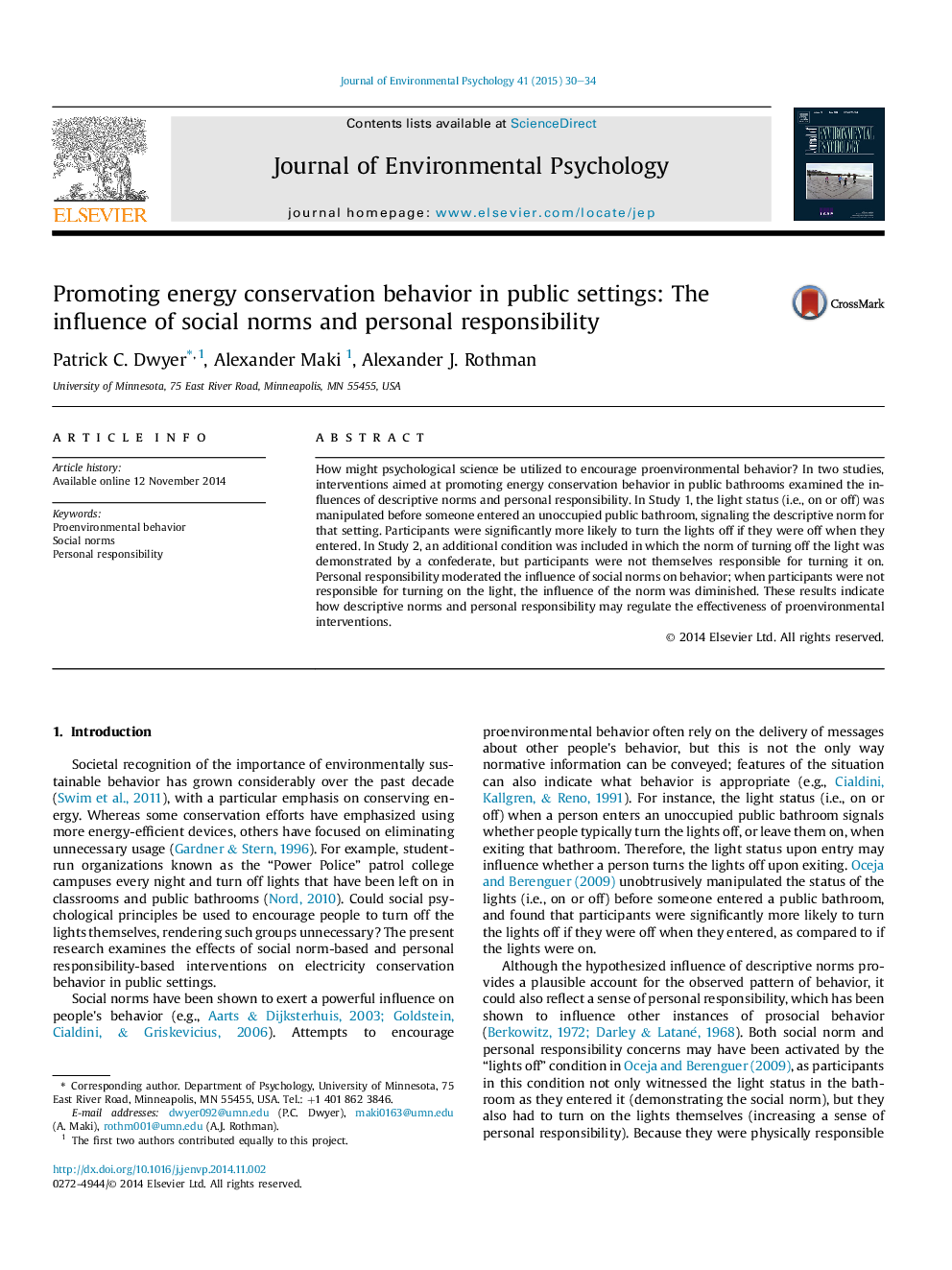| کد مقاله | کد نشریه | سال انتشار | مقاله انگلیسی | نسخه تمام متن |
|---|---|---|---|---|
| 7245895 | 1471753 | 2015 | 5 صفحه PDF | دانلود رایگان |
عنوان انگلیسی مقاله ISI
Promoting energy conservation behavior in public settings: The influence of social norms and personal responsibility
ترجمه فارسی عنوان
ارتقای رفتار حفاظت از انرژی در محیط های عمومی: تأثیر هنجارهای اجتماعی و مسئولیت شخصی
دانلود مقاله + سفارش ترجمه
دانلود مقاله ISI انگلیسی
رایگان برای ایرانیان
کلمات کلیدی
رفتار محیطی، هنجارهای اجتماعی، مسئولیت شخصی،
ترجمه چکیده
چگونه ممکن است علم روانشناختی برای تشویق رفتارهای محیطی مورد استفاده قرار گیرد؟ در دو مطالعه، مداخلات با هدف ارتقای رفتار حفاظت از انرژی در حمام عمومی، تأثیرات هنجارهای توصیفی و مسئولیت شخصی را مورد بررسی قرار دادند. در مطالعه 1، وضعیت نور (به عنوان مثال، روشن یا خاموش) قبل از اینکه کسی وارد یک حمام عمومی غیر اشباع شود، دستکاری شد، و علامت گذاری هنجار توصیفی برای این تنظیم بود. شرکت کنندگان در مقایسه با زمانی که وارد شدند، به شدت بیشتر به نور خاموش می شوند. در مطالعه 2، یک شرایط اضافی شامل می شد که در آن عددی روشن کردن نور یک طرفدار نشان داده شد، اما شرکت کنندگان خودشان مسئول تغییر آن نبودند. مسئولیت شخصی تاثیر تأثیر هنجارهای اجتماعی بر رفتار را کنترل می کند؛ وقتی شرکت کنندگان مسئولیت روشن شدن نور را نداشتند، تأثیر هنجار کاهش یافت. این نتایج نشان می دهد که چگونه هنجارهای توصیفی و مسئولیت شخصی می توانند اثربخشی مداخلات محیطی را کنترل کنند.
موضوعات مرتبط
علوم انسانی و اجتماعی
روانشناسی
روان شناسی کاربردی
چکیده انگلیسی
How might psychological science be utilized to encourage proenvironmental behavior? In two studies, interventions aimed at promoting energy conservation behavior in public bathrooms examined the influences of descriptive norms and personal responsibility. In Study 1, the light status (i.e., on or off) was manipulated before someone entered an unoccupied public bathroom, signaling the descriptive norm for that setting. Participants were significantly more likely to turn the lights off if they were off when they entered. In Study 2, an additional condition was included in which the norm of turning off the light was demonstrated by a confederate, but participants were not themselves responsible for turning it on. Personal responsibility moderated the influence of social norms on behavior; when participants were not responsible for turning on the light, the influence of the norm was diminished. These results indicate how descriptive norms and personal responsibility may regulate the effectiveness of proenvironmental interventions.
ناشر
Database: Elsevier - ScienceDirect (ساینس دایرکت)
Journal: Journal of Environmental Psychology - Volume 41, March 2015, Pages 30-34
Journal: Journal of Environmental Psychology - Volume 41, March 2015, Pages 30-34
نویسندگان
Patrick C. Dwyer, Alexander Maki, Alexander J. Rothman,
